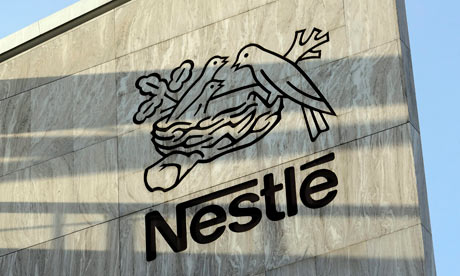
Nestle becomes the largest manufacturer to sign up to the living wage in the UK. Photograph: Laurent Gillieron/EPA
Food giant
Nestlé has become the first leading manufacturer to commit to paying the
living wage.
The firm already pays at least the living wage to its 8,000 staff but the move will benefit contract employees and agency workers. About 800 contractors working with Nestlé will implement it by December 2017.
The announcement was described by campaigners as a significant milestone in the drive to persuade employers to
pay the living wage, which is currently set at £8.80 an hour in London and £7.65 elsewhere, compared to the national minimum wage of £6.31.
Nestlé UK & Ireland's chief executive, Fiona Kendrick, said: "We are proud to be the first mainstream manufacturer in the UK to become a living wage employer and see this as an opportunity to be a positive influence in our sector.
"As a major UK employer, we know that this is the right thing to do. Not only does it benefit our employees but also the communities they live and work in."
Living Wage Foundation director Rhys Moore said: "The accreditation of Nestlé as a living wage employer marks a significant milestone in the campaign to tackle in-work poverty. We hope that the leadership they have shown will encourage others in this industry to follow suit and improve conditions for those at the lowest end of the pay scale and sub-contracted staff.
"We are aware that Nestlé is going above and beyond the basic requirements of becoming an accredited employer, and is extending their commitment to graduate, internship and school leaver programmes."
Len McCluskey, general secretary of Unite, said: "With in-work poverty on the rise, many employers are simply ignoring their responsibility to pay staff a decent wage. They should take note from Nestlé's positive stance which shows that paying a living wage is not just good for communities but makes good business sense too."
Tim Roache, of the GMB union, said: "Nestlé have always recognised their greatest asset is their workforce and are demonstrating this with action, not just words. This shows once and for all that if one leading manufacturer can pay a living wage to all employees including young workers and those contracted out, then many more are able to do so."
The business secretary, Vince Cable, said: "I welcome Nestlé's decision and encourage all businesses to pay their staff above the minimum wage when it is affordable and not at the expense of jobs."
The shadow business secretary, Chuka Umunna, said: "It is fantastic news that Nestlé is announcing its accreditation as a living wage employer, having worked in collaboration with Unite, GMB and the Living Wage Foundation to achieve this.
"We want to see as many businesses as possible take the decision to become living wage employers, so I hope other firms will follow the strong example which Nestlé is setting."







